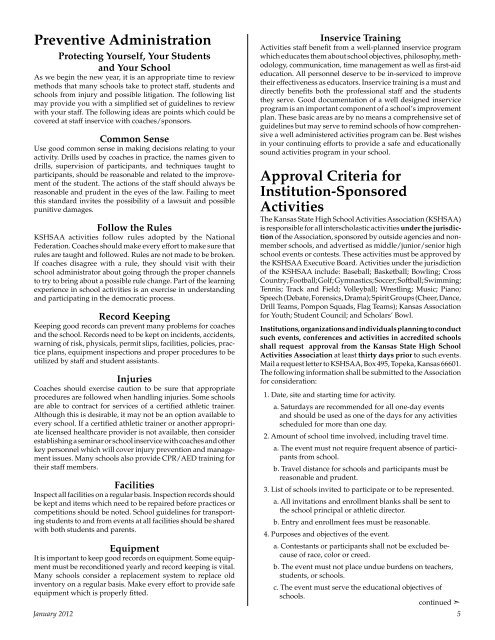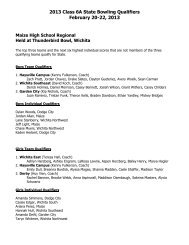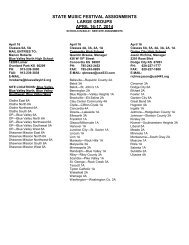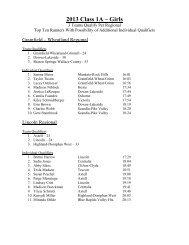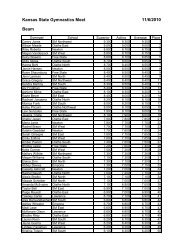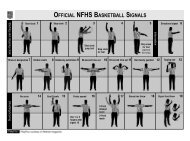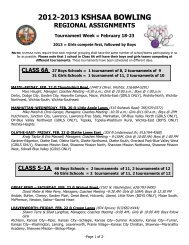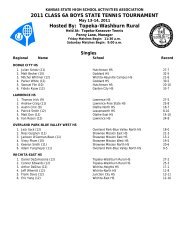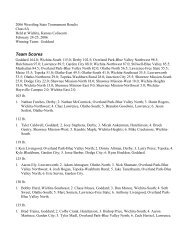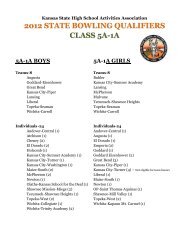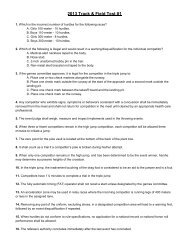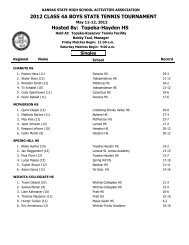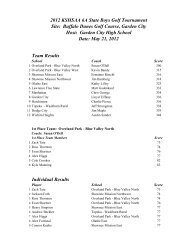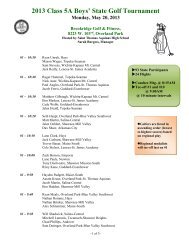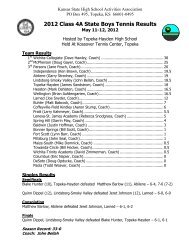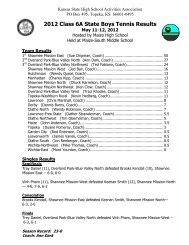K A N S A S S T A T E H I G H S C H O O L JANUARY 2012 - kshsaa
K A N S A S S T A T E H I G H S C H O O L JANUARY 2012 - kshsaa
K A N S A S S T A T E H I G H S C H O O L JANUARY 2012 - kshsaa
You also want an ePaper? Increase the reach of your titles
YUMPU automatically turns print PDFs into web optimized ePapers that Google loves.
Preventive Administration<br />
Protecting Yourself, Your Students<br />
and Your School<br />
As we begin the new year, it is an appropriate time to review<br />
methods that many schools take to protect staff, students and<br />
schools from injury and possible litigation. The following list<br />
may provide you with a simplified set of guidelines to review<br />
with your staff. The following ideas are points which could be<br />
covered at staff inservice with coaches/sponsors.<br />
Common Sense<br />
Use good common sense in making decisions relating to your<br />
activity. Drills used by coaches in practice, the names given to<br />
drills, supervision of participants, and techniques taught to<br />
participants, should be reasonable and related to the improvement<br />
of the student. The actions of the staff should always be<br />
reasonable and prudent in the eyes of the law. Failing to meet<br />
this standard invites the possibility of a lawsuit and possible<br />
punitive damages.<br />
Follow the Rules<br />
KSHSAA activities follow rules adopted by the National<br />
Federation. Coaches should make every effort to make sure that<br />
rules are taught and followed. Rules are not made to be broken.<br />
If coaches disagree with a rule, they should visit with their<br />
school administrator about going through the proper channels<br />
to try to bring about a possible rule change. Part of the learning<br />
experience in school activities is an exercise in understanding<br />
and participating in the democratic process.<br />
Record Keeping<br />
Keeping good records can prevent many problems for coaches<br />
and the school. Records need to be kept on incidents, accidents,<br />
warning of risk, physicals, permit slips, facilities, policies, practice<br />
plans, equipment inspections and proper procedures to be<br />
utilized by staff and student assistants.<br />
Injuries<br />
Coaches should exercise caution to be sure that appropriate<br />
procedures are followed when handling injuries. Some schools<br />
are able to contract for services of a certified athletic trainer.<br />
Although this is desirable, it may not be an option available to<br />
every school. If a certified athletic trainer or another appropriate<br />
licensed healthcare provider is not available, then consider<br />
establishing a seminar or school inservice with coaches and other<br />
key personnel which will cover injury prevention and management<br />
issues. Many schools also provide CPR/AED training for<br />
their staff members.<br />
Facilities<br />
Inspect all facilities on a regular basis. Inspection records should<br />
be kept and items which need to be repaired before practices or<br />
competitions should be noted. School guidelines for transporting<br />
students to and from events at all facilities should be shared<br />
with both students and parents.<br />
Equipment<br />
It is important to keep good records on equipment. Some equipment<br />
must be reconditioned yearly and record keeping is vital.<br />
Many schools consider a replacement system to replace old<br />
inventory on a regular basis. Make every effort to provide safe<br />
equipment which is properly fitted.<br />
Inservice Training<br />
Activities staff benefit from a well-planned inservice program<br />
which educates them about school objectives, philosophy, methodology,<br />
communication, time management as well as first-aid<br />
education. All personnel deserve to be in-serviced to improve<br />
their effectiveness as educators. Inservice training is a must and<br />
directly benefits both the professional staff and the students<br />
they serve. Good documentation of a well designed inservice<br />
program is an important component of a school’s improvement<br />
plan. These basic areas are by no means a comprehensive set of<br />
guidelines but may serve to remind schools of how comprehensive<br />
a well administered activities program can be. Best wishes<br />
in your continuing efforts to provide a safe and educationally<br />
sound activities program in your school.<br />
Approval Criteria for<br />
Institution-Sponsored<br />
Activities<br />
The Kansas State High School Activities Association (KSHSAA)<br />
is responsible for all interscholastic activities under the jurisdiction<br />
of the Association, sponsored by outside agencies and nonmember<br />
schools, and advertised as middle/junior/senior high<br />
school events or contests. These activities must be approved by<br />
the KSHSAA Executive Board. Activities under the jurisdiction<br />
of the KSHSAA include: Baseball; Basketball; Bowling; Cross<br />
Country; Football; Golf; Gymnastics; Soccer; Softball; Swimming;<br />
Tennis; Track and Field; Volleyball; Wrestling; Music; Piano;<br />
Speech (Debate, Forensics, Drama); Spirit Groups (Cheer, Dance,<br />
Drill Teams, Pompon Squads, Flag Teams); Kansas Association<br />
for Youth; Student Council; and Scholars’ Bowl.<br />
Institutions, organizations and individuals planning to conduct<br />
such events, conferences and activities in accredited schools<br />
shall request approval from the Kansas State High School<br />
Activities Association at least thirty days prior to such events.<br />
Mail a request letter to KSHSAA, Box 495, Topeka, Kansas 66601.<br />
The following information shall be submitted to the Association<br />
for consideration:<br />
1. Date, site and starting time for activity.<br />
a. Saturdays are recommended for all one-day events<br />
and should be used as one of the days for any activities<br />
scheduled for more than one day.<br />
2. Amount of school time involved, including travel time.<br />
a. The event must not require frequent absence of participants<br />
from school.<br />
b. Travel distance for schools and participants must be<br />
reasonable and prudent.<br />
3. List of schools invited to participate or to be represented.<br />
a. All invitations and enrollment blanks shall be sent to<br />
the school principal or athletic director.<br />
b. Entry and enrollment fees must be reasonable.<br />
4. Purposes and objectives of the event.<br />
a. Contestants or participants shall not be excluded because<br />
of race, color or creed.<br />
b. The event must not place undue burdens on teachers,<br />
students, or schools.<br />
c. The event must serve the educational objectives of<br />
schools.<br />
continued ➣<br />
January <strong>2012</strong> 5


